What is electronic health care?
Electronic health care is also known as electronic health records (EHR) or electronic medical records (EMR).
This refers to the digitalization and storage of patient health information.
It involves the use of electronic systems to collect, store, and manage patient data.
This includes medical history, diagnoses, medications, treatment plans, and test results.
Electronic health care systems are designed to streamline healthcare processes, improve patient care, and enhance communication between healthcare providers.
These systems replace traditional paper-based records and offer numerous benefits to both healthcare professionals and patients.
The Benefits of Electronic Health Care
Electronic health care systems offer several advantages over traditional paper-based records:
- Improved Efficiency: EHC systems allow healthcare providers to access patient information quickly and easily. This eliminates the need for manual searching through paper records, saving time and improving efficiency.
- Better Coordination of Care: EHC systems enable different healthcare professionals to access and update patient records in real-time. This improves coordination and collaboration among healthcare teams, leading to better patient outcomes.
- Enhanced Patient Safety: EHC systems reduce the risk of errors and improve patient safety. They provide alerts and reminders for medication interactions, allergies, and potential medical errors, ensuring that healthcare providers make informed decisions.
- Increased Accessibility: EHC records can be accessed securely from anywhere, allowing healthcare providers to provide continuity of care even when patients visit different healthcare facilities or specialists.
- Cost Savings: EHC systems reduce administrative costs associated with paper-based records, such as printing, storage, and transportation. They also minimize duplicate tests and procedures, resulting in cost savings for healthcare organizations.
- Improved Research and Analysis: EHC systems facilitate data analysis and research. Researchers can access anonymized patient data to study population health trends, identify patterns, and develop evidence-based treatment protocols.
The Disadvantages of EHC systems
While EHC systems offer numerous benefits, they also come with some disadvantages:
- Security and Privacy Concerns: These systems require robust security measures to protect patient information from unauthorized access or breaches. Privacy concerns arise due to the potential for data breaches or misuse of sensitive patient data.
- Initial Implementation Costs: Implementing EHC systems can be expensive, requiring investments in hardware, software, training, and data migration. Smaller healthcare organizations may face financial challenges when adopting these systems.
- Learning Curve: Healthcare professionals and staff need to undergo training to effectively use these systems. There may be a learning curve associated with transitioning from paper-based records to digital systems.
- Technical Issues: EHC systems rely on technology, and technical issues such as system downtime or software glitches can disrupt workflow and patient care. Backup systems and contingency plans need to be in place to minimize such disruptions.
- Interoperability Challenges: Different EHC systems may have varying formats and standards, making it challenging to exchange patient information seamlessly between different healthcare organizations. Interoperability issues can hinder the sharing of vital patient data.
- Potential for Data Loss: While EHC systems provide backup and recovery mechanisms, there is still a risk of data loss due to hardware failures, natural disasters, or cyberattacks. Regular data backups and robust security measures are essential to mitigating this risk.
OTHER INTERESTING BLOG POST
Electronic Health Care vs. Natural Health Care
Electronic health care and natural health care represent two different approaches to healthcare:
EHC focuses on digitizing and managing patient health information using electronic systems. It emphasizes the use of technology to streamline healthcare processes, improve efficiency, and enhance patient care.
Natural health care, on the other hand, refers to healthcare practices that prioritize natural remedies, holistic approaches, and alternative therapies. It emphasizes the body’s innate healing abilities and promotes wellness through lifestyle changes, nutrition, and non-invasive treatments.
While electronic health care and natural health care may seem contrasting, they are not mutually exclusive. In fact, electronic health care systems can support and enhance natural health care practices by providing healthcare providers with comprehensive patient information, facilitating communication, and enabling evidence-based decision-making.
Six Examples of EHC Software and Their Benefits
There are numerous electronic health care software solutions available in the market. Here are six examples and how they improve patient care:
- Epic Systems Corporation: This system is a widely used EHC software that offers comprehensive features for healthcare organizations.

It enables seamless integration of patient records, laboratory results, and imaging data, improving care coordination and patient safety.
Cerner Corporation: Cerner provides health solutions that focus on interoperability and data exchange.
It allows healthcare providers to access patient information from various sources, facilitating informed decision-making and efficient care delivery.
Cerner’s innovative technology streamlines processes and improves patient outcomes by connecting health systems, clinicians, and patients.
With a commitment to advancing healthcare through cutting-edge solutions, Cerner is a trusted partner for organizations looking to enhance their digital capabilities and provide high-quality care.
Allscripts Healthcare Solutions:

This is an EHC software that emphasizes user-friendly interfaces and customization options. It enables healthcare providers to tailor the system to their specific workflows, enhancing efficiency and user satisfaction.This flexibility allows for seamless integration with existing systems and smooth transitions for staff. Allscripts Healthcare Solutions prioritizes patient care and provider needs, striving to improve outcomes and streamline processes in the ever-evolving healthcare industry.

More Examples of EHC Softwares
- eClinicalWorks provides electronic health care solutions for both primary care and specialty practices. Its features include appointment scheduling, billing, and patient engagement tools, improving practice management and patient experience.
- : NextGen Healthcare offers electronic health care software with advanced analytics capabilities. It enables healthcare organizations to analyze patient data, identify trends, and optimize care delivery for better patient outcomes.


- . Kareo: Kareo is a cloud-based EHC software designed for small to medium-sized practices. It offers features such as electronic prescribing, telemedicine integration, and revenue cycle management, simplifying practice operations and improving patient engagement.
These examples represent just a fraction of the EHC software solutions available.
Each piece of software has its own unique features and benefits, catering to the diverse needs of healthcare organizations and providers.
In conclusion,
Electronic health care systems have changed the healthcare industry by digitizing patient records and improving care coordination. While they offer numerous benefits, it is essential to address the associated challenges, such as security concerns, implementation costs, and interoperability issues.
By leveraging the right EHC software and ensuring proper training and security measures, healthcare organizations can harness the power of technology to enhance patient care and outcomes.
Thank you for reading.Do you know of any other EHC software I did not mention? Drop your comments below.Don’t forget to follow me on Pinterest for more health tips.







